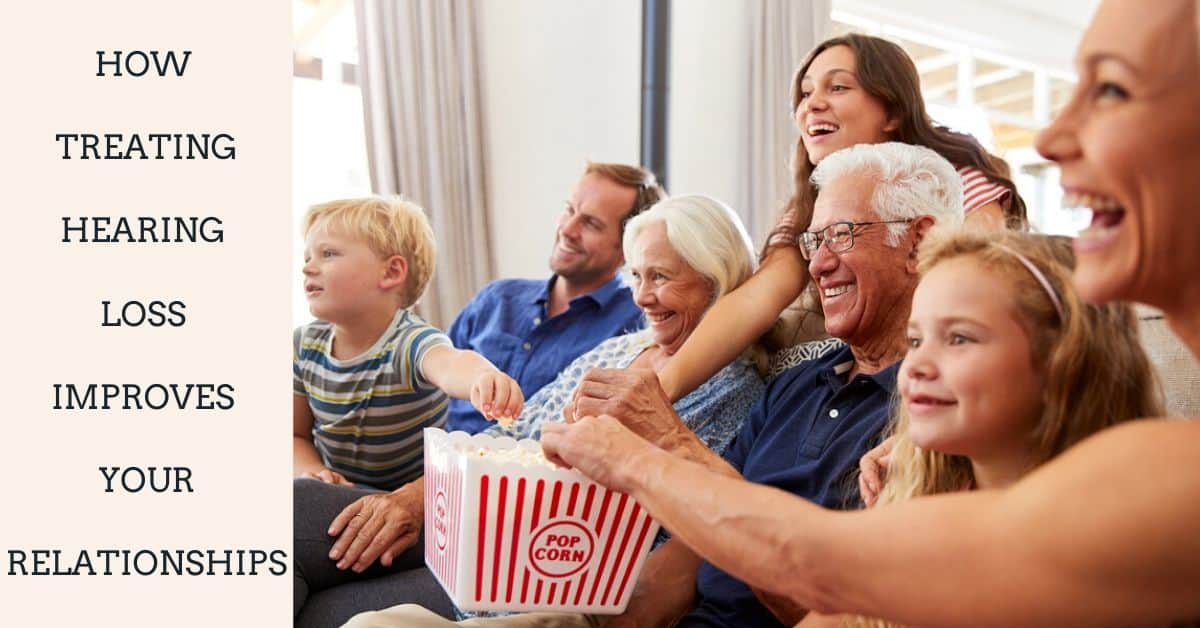0% financing available. Up to 3-year loss and damage guarantee.

How Treating Hearing Loss Improves Your Relationships
- Navigating the Conversation: The Significance of Thoughtful Disclosure in Hearing Loss - December 10, 2023
- The Sound of Dreams: Understanding How Hearing Loss Impacts Dreaming - November 7, 2023
- Traveling Effectively with Hearing Aids - October 16, 2023
As time passes, we come to appreciate more and more the love and support of those closest to us. Through life’s ups and downs, we rely on the love and support of friends and family to lend a hand or an ear, and we do the same for them.
But if we are having trouble hearing, communicating our support for one another can become difficult. Straining to hear what’s being said to us will wear us out after a shorter time. In restaurants or bars, we are inundated with background noise, making it more difficult to discern what is being said to us from the conversations around us, or the sound from the radio. After a while, we can start to shy away from social engagements altogether, trying to avoid the awkwardness of asking people to repeat themselves and the exhaustion of straining to hear.
Most Hearing Loss is Untreated
The unfortunate reality is that most cases of hearing loss are currently going untreated. Only one out of four people who could benefit from hearing aids is fitted with them. Worse yet, it has been reported that 44% of people over age 55 who experience hearing loss have seen a negative effect on their relationships, with 33% saying they have experienced the end of a close relationship as a direct result of hearing loss. And, in a study published in the ASHA Leader in 2007 (https://leader.pubs.asha.org/doi/10.1044/leader.AN3.12092007.5), 35% of respondents indicated that their relationships with their significant others were the most affected by their hearing loss. These are large percentages to consider as Valentine’s Day approaches and we desire to strengthen our bonds with our partners and other loved ones.
Communication is Affected by Hearing Loss
Even the most trivial conversations we have with our partners is an important exchange over a lifetime of building closeness and trust. It can be easy to imagine that only the “big conversations” are the important ones, where we talk about major changes or make financial decisions. But more and more research into successful relationships is showing that our reactions to small moments, off-hand comments, and momentary “bids” for attention are the best indicators of the longevity of our relationships. When we think about this, it makes perfect sense that the loss of our hearing, left untreated, could lead to major problems for our relationships. If we can’t hear what our partners are saying, we have no chance of responding to them. Who knows how many jokes, asides, or other opportunities to appreciate the wonderful ways our partners’ minds work we will miss out on by simply not hearing them? Even a simple act like watching television together becomes less of a shared experience when we can’t hear what’s happening in a show or our partners’ running commentary.
Imagine that you’re out for dinner. The restaurant is not crowded, but the ceilings are high and the room is more reverberant than usual. While the conversations at the nearby tables are not boisterous, you can hear them. You’re having a hard time making out what your partner is saying. You ask them to repeat what they just said a few times, and eventually they start speaking a little louder. But they do not want to be heard too loudly by the other patrons in the restaurant, so they start to say less. What was intended to be a close, shared experience has become strained because neither of you feels comfortable conversing normally. Does this sound familiar? It’s an all-too-common experience, and it doesn’t need to happen again.
Hearing Aids Alleviate Hearing Loss
The most common treatment for hearing loss is hearing aids. Once treated, an overwhelming majority of patients report improvements in their relationships, quality of life, and overall sociability. Hearing loss is a very common affliction for those over 55, but there is no reason to let it take over our lives. By scheduling a hearing test and getting fitted for hearing aids, we can continue to take part in life and, especially, be there for our partners. We can feel present in public without straining or needing our loved ones to repeat themselves, or try to talk over a din. Making the decision to get a hearing test today is not only the best thing for us, but also for those closest to us.
